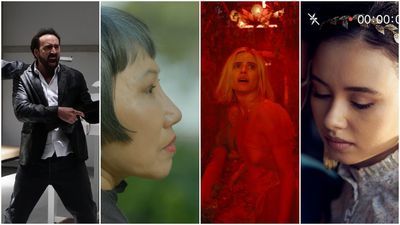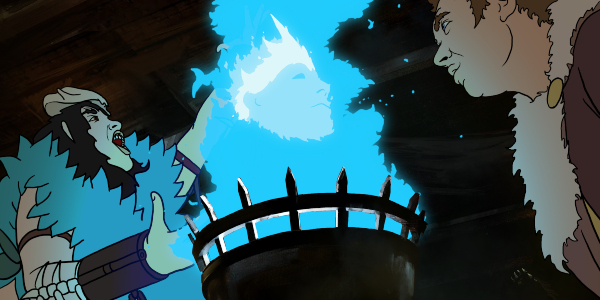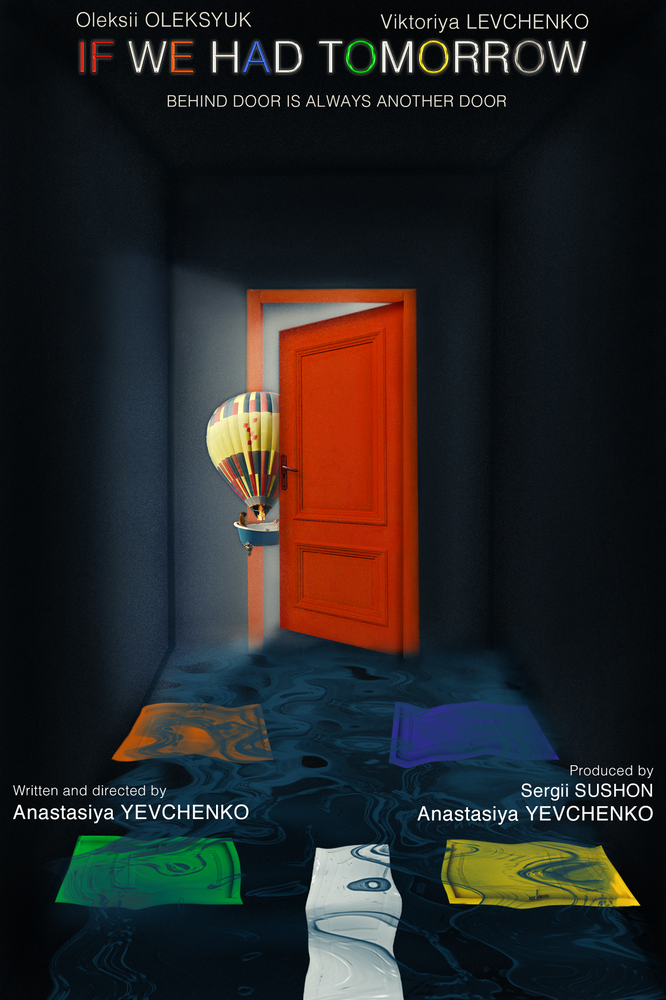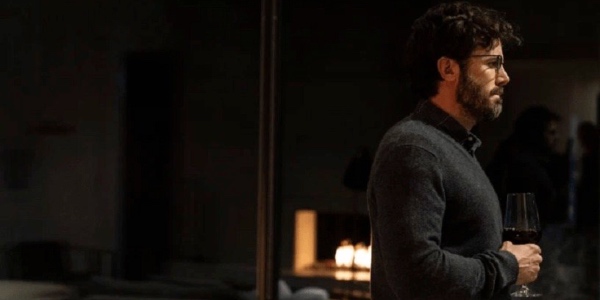Actor Profile: Kirsten Dunst
A vampire, a cheerleader, a French Queen and a beautician who commits a hit and run. What do these have in common? Aside from being potential Halloween costume ideas, these are all film roles played by Kirsten Dunst, in a movie career that began at the tender age of seven and which has been on a steady stream of invention ever since.
Dunst has risen from child star to leading lady, fusing her characters with naturalistic charm, impish tendencies, effervescent spirit, and steely determination. She is an actor who has worked with some of the industry’s leading talents – from emerging directors to those that court controversy and she is someone that values the pact of sisterhood both off-screen and on-screen, depicting this in many of the roles she has played.
Dunst checks in…to Hollywood
Kirsten Caroline Dunst was born on 30th April 1982 in New Jersey to parents Inez (née Rupprecht) and Klaus Dunst. Her mother owned an art gallery and her father was a medical services executive from Hamburg, Dunst herself has German citizenship. Life in the spotlight began at a very young age for Kirsten when she began a career in child modelling and commercials. Putting on plays with her cousins was also part of Dunst’s formative years and would set the foundations for the career she would come to have.
Her work in commercials would lead to her first uncredited film appearance in Woody Allen’s New York Stories (1989) and then to her first official screen credit in Brian De Palma’s muddled movie Bonfire of the Vanities (1990). When her family moved to Los Angeles in 1993, this gave Dunst the opportunity for more film work and would lead to a role that would catapult her into the gaze of Hollywood and its subsequent limelight.
With Brad in the big leagues
In 1994 Dunst was cast in an adaptation of Anne Rice’s gothic novel Interview with a Vampire: The Vampire Chronicles which was directed by Neil Jordan and featured the pinnacle of 1990s megastar pairing of Tom Cruise and Brad Pitt. Dunst played Claudia, a child who is turned into a vampire by Cruise’s outlandish and tempestuous Lestat but who is protected by the paternal instincts of Pitt’s vampire Louis. Dunst’s performance in the film is startlingly complex and mature, echoing her character’s inner and outer turmoil. Her Claudia ages mentally but her body is unable to do so and therefore is trapped in a state of confusion. The world, and Lestat, see her as a little girl, heightened by her Shirley Temple crown of curls but her mind yearns to be a woman which will lead to murderous consequences. For an actor of such a young age, Dunst’s Claudia is an arresting portrayal and would prove to be a breakthrough calling card for her Hollywood career, resulting in a Golden Globe nomination aged 12.
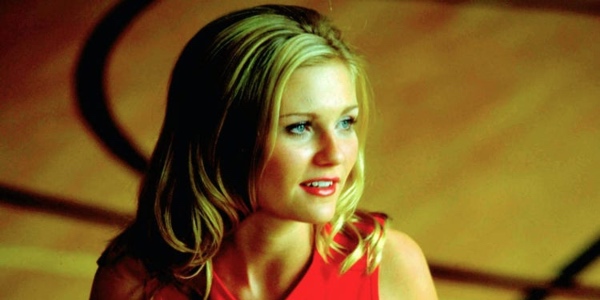
Though Dunst was to receive her first taste of negative press spin when many media outlets chose to focus on her character Claudia’s kiss with Pitt’s Louis, assuming the young actor must see herself as fortunate to be in the position of sharing an intimate moment with the world’s biggest heartthrob. In the context of the film, the scene perfectly encapsulates the relationship her character wants to taste but is denied, but beyond the film the idea that Dunst, who at the time of filming was 12 years old would enjoy a kiss with then 30-year-old Pitt, was inappropriate. This was encapsulated impeccably by Kirsten who at the time responded to the red-carpet question with the response that the moment was ‘gross’, something she would continue to stand by years later.
Whilst the world’s press would take the salacious route and focus on one scene, negating the multi-layered performance she had produced, it would not matter in the end for Dunst who had shown Hollywood just a glimpse of what she could do. Interview with a Vampire would go on to receive mixed reviews and responses save for Dunst who was clearly the standout force in the film, managing to eclipse two of the industry’s biggest stars who had to console themselves with a Golden Raspberry award for the worst onscreen duo.
Subverting the Child Star Route
After receiving the acclaim and attention for her big break at such a young age, it would have been easy and predictable for Dunst to become a brat of the studio system with illusions of grandeur. But instead of falling into the trappings that befell many young actors, Kirsten kept her feet firmly on the ground, something many child stars are unable to do when they experience fame at a young age and who then are doomed to a fate of burnout, drugs, and rehab.
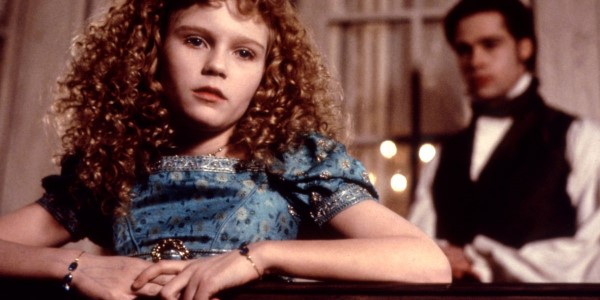
Sidestepping any form of teenage rebellion confessing she’s ‘not that type of person’, Dunst would go on to work in a string of family-friendly films that have become classics for a generation including Little Women (1994), Jumanji (1995), and Small Soldiers (1998). In these performances, Dunst manages to mix a sense of childlike wonder with a spirited determination, a combination that makes the viewer root continuously for her.
Whilst some child actors can come across as overconfident and smug, she walks the tightrope of optimistic naivety and grounded maturity, never too arrogant to make the viewer unsympathetic but never too childlike to make us cringe. She continued to build a career, growing up on screen whilst keeping her head and navigating her teen years, ready to transform to the next phase of how she would be seen in the audience’s eyes.
Satire, Sofia, Squads and Superheroes
Dunst began to transition from child actor to teen queen during the end of the 90s and the beginning of the next decade. First was Dick (1999) an underrated comedic reimagining of the Watergate scandal involving two teenage girls played by Dunst and Michelle Williams. Another underrated gem that feels more relevant in our media/image-obsessed times is Drop Dead Gorgeous (1999) a darkly comic satire on the teen beauty pageant world. Kirsten plays Amber Atkins, the bright-eyed, optimistic contestant from a low-income family who is competing against the richest teenager in their town Becky Leeman (Denise Richards), and her family’s penchant for rigging the result. It is evident that we, the audience, will be rooting for Amber but Dunst makes it so easy to do so, with her effervescent charm, sunshine wide smile, and underdog plucky nature.
Dunst rounded off the decade with what would become a seminal moment artistically in her career by starring in Sofia Coppola’s directorial debut The Virgin Suicides (1999). It would begin a fruitful relationship between the two which would see them collaborating on three films together. In Coppola, Dunst had found her cinematic spiritual big sister and someone who would shape her confidence and in turn, her career.
In the film, Dunst plays Lux Lisbon, one of five adolescent sisters trying to grow up in 1970s Detroit under the strict eye and rules of their religious parents. After the youngest daughter attempts suicide, the girls become stifled under the cloying regime of their parental home. Dunst’s Lux is the wildflower of the group, her head turned by the school heartthrob Trip Fontaine (Josh Hartnett), she yearns for freedom and escapism, but this time her hopeful spirit is tinged with hints of melancholia, her face is both expectant but disenchanted. In one scene, the girls are miraculously allowed to attend a school disco though the bubble of a dreamy teenage rites of passage is fleeting.
Lux spends the night with Trip on the football field but in the morning he has abandoned her, as the sun rises, she appears like a fallen angel, her blond hair like an overgrown halo, and her expression belies the realisation that her wings are about to be clipped. She takes the lone journey back to her home which will soon become her prison, the otherworldly light from her face has turned to a mournful presence. Recalling the making of The Virgin Suicides, Dunst said “People saw me in a different light, as not just a little girl anymore after The Virgin Suicides. And I was lucky, because it was Sofia. I was in a woman’s hands.”
Dunst would next go on to star in Bring It On (2000), a film about high school cheerleading competitions which would give her leading star status, and which became a big hit in the teen flick pantheon. Kirsten would use her winning mix of spirited resolve, perky optimism, and damaged pride to her role as Torrance who finds out her team’s cheerleading routines were stolen from their rival competitors. The film would go on to make Dunst a bigger name in Hollywood and lead to her casting in a major summer blockbuster franchise and to the role she would become most known for to mainstream audiences.
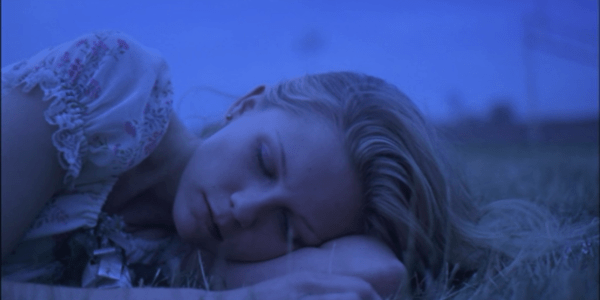
Cast as Mary Jane in Spider Man (2002), Dunst would be the love interest to Tobey Maguire’s web-slinging superhero. Taking the role, she knew it was more of an opportunity to reach a bigger audience, particularly oversees, rather than an artistic move. Though she refused to comply completely to the big studio machine, when the producers asked her to fix her teeth to a more Hollywood veneered aesthetic, she recalled the words of Coppola who had expressed how much she liked the actress’s teeth and rejected their suggestions. And whilst she was the love interest role, Dunst did embody her character with a little more than just screaming and being in peril, her subplot of being from a broken home and an aspiring actress who crucially does not get the Hollywood ending by making it in the big time gave a little more realism to the comic book world. Dunst would reprise her character for two sequels Spider-Man 2 (2004) and Spider-Man 3 (2007) but by the last film of the series, the spark had appeared to go out and Dunst had little left to do with her character.
Monarchs and melancholic moods
Amidst a smattering of forgettable romcoms such as playing a tennis star in Wimbledon (2004) and playing a generic manic pixie dream girl in Cameron Crowe’s tepid Elizabethtown (2005), Dunst needed some creative pizazz to her CV. She had a supporting but pivotal role in Michel Gondry’s memory blurred masterpiece Eternal Sunshine of the Spotless Mind (2004) as a girl trapped in a cycle of love and regret with her boss. And she would go on to star in her second collaboration with Sofia Coppola with 2006’s Marie Antoinette, a retelling of France’s iconic but tragic Queen from her marriage at the age of 15 to Louis XVI to her reign and the eventual fall of Versailles.
The film was an impressionistic and modern take on history, its primary concern was less about facts and more about creating a mood, with its contemporary heavy soundtrack, sumptuous production design, and gorgeous cinematography. Marie Antoinette was heavily criticised upon release and whilst it’s not without faults, there is a beauty within its frames and within Dunst’s performance. She perfectly captures the feeling of a young girl thrust into a world of scrutiny, as she herself experienced at an early age, her petite frame engulfed within a waft of fabric and layers, making her appear lost within this new world. Her subsequent rebellion against her preordained role allows Dunst to express her impish grin and sly charm while she also allowed softer moments of calm after the party has died and she realises what is of importance in life and the sadness that sweeps across her face as her home and life are torn apart.
After a few years where her film input slowed down, Dunst returned with a role for a controversial director that gave her one of her most complex and acclaimed performances. In Lars Von Trier’s Melancholia (2011), Dunst plays Justine who is experiencing regret over her unfolding wedding whilst a planet is on a collision course for earth, though this being Von Trier things are not as simple as this.
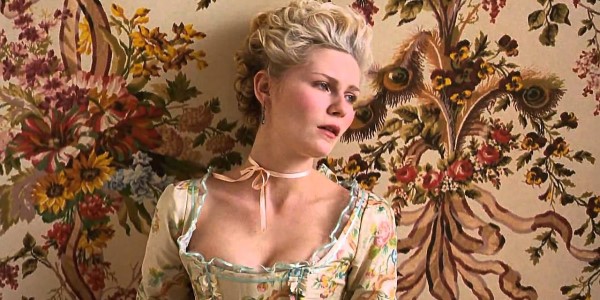
The film focuses on the relationship between Justine and her sister Claire (Charlotte Gainsbourg) as they both deal with the potential impending doom in different ways. Melancholia explores the theme of depression with Dunst’s character (something the actor has revealed has affected her personally) and she brings something new that we have not quite seen in a performance from her before. For an actor that so frequently imbues a sense of glow and spark, her Justine is someone who has lost her light, the glimmer in her eyes has a mournful gaze and her body carries the weariness of the world’s weight. It is a beautifully sad manifestation of how depression can take hold of a person’s spirit and vanquish your hope.
Dunst would go on to win the Best Actress award at Cannes in 2011 however, almost reminiscent of her Golden Globe nomination for Interview with a Vampire, the recognition was overshadowed by the coverage of her director’s behaviour at a press conference which subsequently saw Von Trier banned from the festival.
Turning to TV
After Melancholia, Dunst starred in Bachelorette (2012), which was closer in tone to Very Bad Things than Bridesmaids and Walter Salles’ adaptation of Jack Kerouac’s seminal novel On the Road (2012). She also starred in Hossein Amini’s beautifully shot Two Faces of January (2014) which was an adaptation of the Patricia Highsmith thriller.
But one of her best-received roles would come from her performance in the second installment of the TV Series anthology Fargo (2015). Dunst plays Peggy Blumquist, a small-town beautician with loftier ambitions that are at odds with her simple life butchers’ assistant husband Ed (Jesse Plemons). When Peggy is involved in a hit and run, it embroils the couple in a chain of events much larger and beyond their world that they could have imagined. As Peggy, Dunst is stellar, someone who despite their wavering moral compass is never not endearing and who you oddly remain rooting for. As the consequences of her actions mount, every feeling is played out on her hugely expressive face, it is a sublime performance and one that rightly earned her another Golden Globe nomination.
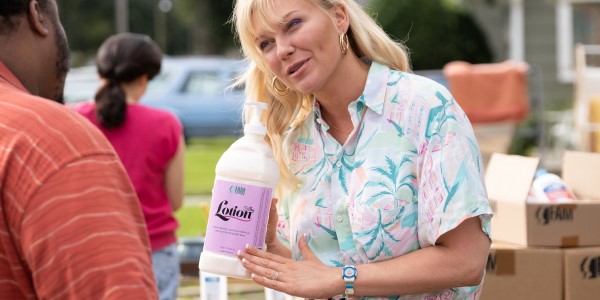
Dunst would then go back to the big screen for an against-type performance in Hidden Figures (2016). Rarely is she an unsympathetic character but in Theodore Melfi’s film, she removes the charm and dials up the unlikeable. In 2017, she would return to her favoured female director Sofia Coppola for her reworking of The Beguiled. The film is about an injured Union soldier (Colin Farrell) who seeks help from the women who run an insulated Confederate school during the Civil War, but his arrival stirs repressed feelings and jealousy among their solitary lives. Dunst is the heart and heartbroken of the film, her prim teacher is buttoned up with a face full of sorrow but who is tempted by the promise of escape by Farrell’s McBurney and whose eyes begin to glimmer with the look of envy to her younger rival.
Kirsten’s most recent role has been a triumphant run in the darkly comic and colourful TV series On Becoming a God in Central Florida (2019). Set in 1992, Dunst stars as Krystal Stubbs, a low-level employee at a water park who becomes tangled in a world of pyramid schemes and the promise of making her life better. Dunst turns the charm back on to play a scrappy, feisty strong figure who despite the falseness and flaws in the American Dream turns it to her advantage. There are moments where life is clawing at the walls to knock everything down, but she continues, against the odds and again brings the audience into her realm, to root for her realness and plucky spirit. Her portrayal as Krystal Stubbs resulted in another nomination at this year’s Golden Globes but again there would be no win for Dunst.
The series has been renewed for a second season so Dunst will be remaining in the TV world for now but which direction she will head in next is not known. She is an actor who has survived periods of a film career that have taken many of her contemporaries as casualties, from her child star days, to teen queen, to summer blockbuster star. Though she is also someone who, despite some high profile roles, still flies somewhat under the radar and perhaps that’s where she wants to be, commenting ‘I don’t want to be ‘box-office girl,’ but I don’t want to be ‘that indie girl’ either’. Perhaps the undecided trajectory of her career is what has afforded its longevity and what keeps that spark in her mischievous smile.
What are your favourite performances by Kirsten Dunst? What type of role would you like to see her do next?
Does content like this matter to you?
Become a Member and support film journalism. Unlock access to all of Film Inquiry`s great articles. Join a community of like-minded readers who are passionate about cinema – get access to our private members Network, give back to independent filmmakers, and more.
Join now!


